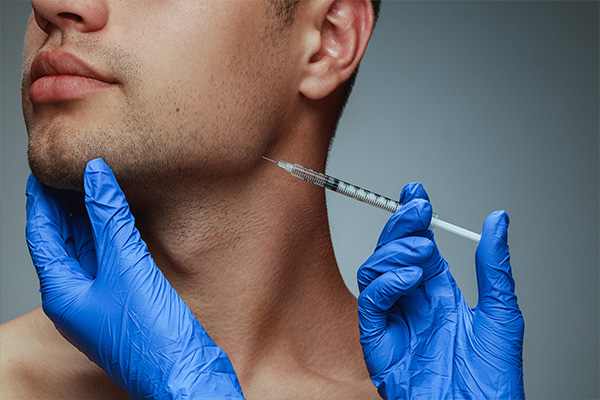


Botox injections aren’t just for wrinkle reduction. Many people are turning to Botox injections for TMJ and/or migraine relief. Botox is used as an alternative treatment for TMJ (temporomandibular joint) disorders and associated jaw tension and pain. When injected into facial muscles afflicted with soreness and discomfort, Botox relieves TMJ and jaw tension for many patients. The injections often eliminate headaches resulting from teeth grinding, and, in cases of severe stress, Botox can even minimize lockjaw. Although Botox treatment for these conditions is presently experimental, evidence indicates that it can be extremely effective. Are you wondering how Botox can be helpful in TMJ treatment? Here’s an overview of the essentials.
The temporomandibular joint is used during talking, eating, swallowing, and other everyday activities. If this joint becomes displaced or is overworked through excessive teeth grinding, a person may suffer severe tension headaches, as well as sharp pain in the jaw. If it becomes inflamed, you may suffer pain, especially while chewing. The pain associated with this joint is termed temporomandibular joint disorder or myofascial pain commonly known as TMJ.
Botox relieves jaw tension by making muscles unable to engage in the powerful, often the unconscious movement of the jaw that produces headaches and pain. When you opt for Botox injections for TMJ treatment the injections help relax the muscles around that joint. The injections reduce jaw tension, help you stop grinding your teeth, and virtually eliminate headaches related to TMJ. The injection process is less invasive and more affordable than surgery. It’s also so fast and easy you can do it on your lunch hour.
First, Dr. Abtin Shahriari will do a consultation with you which includes a complete head and neck exam, and a more focused TMJ exam. If you do fall in the category of patients that would benefit from Botox injections for TMJ and headaches, then, either on the same appointment or a different appointment, our board-certified oral and maxillofacial surgeon administers one or more injections in the muscles. Depending on the number of injections you need, the procedure can take anywhere from ten minutes to a half an hour.
Most patients report that the injections feel like a small insect sting. However, if you don’t like the idea of needles or just need extra help relaxing, you can opt for nitrous oxide. This wears off immediately so you can safely drive after the procedure.
Immediately after your appointment, you may feel a bit of soreness or tenderness. That tends to wear off almost immediately, but if needed, you can put a cold pack on your face. There may also be some minor bruising or tenderness.
Within the following 4-7 days, you may feel less tense in the jaw muscles and muscles that are associated with the TMJ. Finally, after a week, your TMJ symptoms should start to feel better. For some patients, it takes a week for the symptoms to improve. To continue the effects, you usually need to return for repeat treatments in 3-4 months. Your oral surgeon can advise you on the right schedule for your needs.
There can be minor side effects of this procedure. Some patients experience headaches or nausea. Others find the injections painful or get bothered by redness or bruising at the site of the injections.
If you are pregnant or breastfeeding, you should avoid these treatments. Additionally, some patients develop antibodies, and that can make future injections less effective. However, you can prevent this risk by starting with a lower dosage.
In many cases, you can diagnose your own TMD. The symptoms include pain and soreness when you wake up in the morning or after chewing.
If you think you have TMD, clenching or grinding and want to discuss Botox injections for TMJ or other treatment options, contact Greater Atlanta Oral Facial Surgery today. We are an oral and maxillofacial dental office with locations in Cumming and Buckhead, Atlanta.